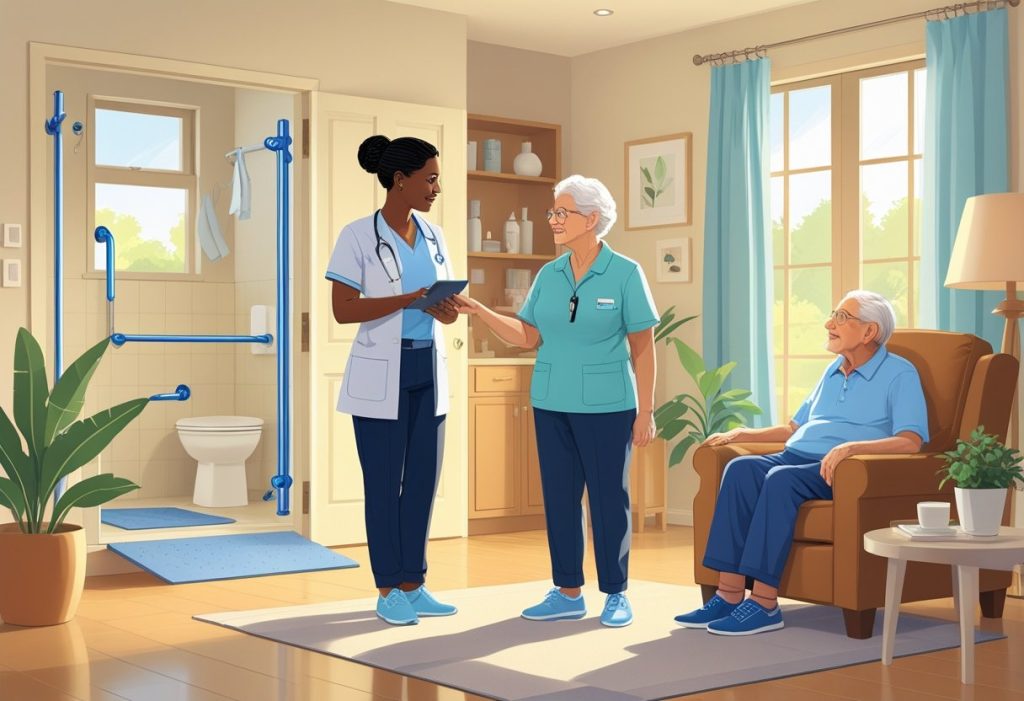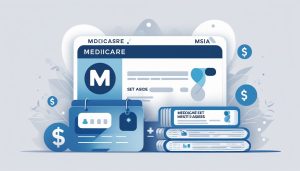Understanding which Medicare plans cover home safety modifications can significantly impact your ability to create a safer living environment. Original Medicare typically does not cover home modifications, but some Medicare Advantage Plans may offer partial coverage for certain modifications deemed medically necessary. This distinction is crucial for anyone looking to maintain their independence while ensuring their home remains safe and accessible.
At The Modern Medicare Agency, you will find dedicated support to navigate your Medicare options effectively. Our licensed agents work with you one-on-one to identify packages that fit your specific needs without imposing extra fees. This personalized approach ensures you receive the best possible coverage without unnecessary financial stress.
Exploring your Medicare options for home safety modifications can lead to enhanced well-being and peace of mind. By understanding your coverage choices, you can make informed decisions that support your lifestyle and security.
Overview of Medicare Coverage for Home Safety Modifications
Medicare generally does not cover most home safety modifications, focusing instead on durable medical equipment. Understanding what qualifies as a home safety modification and the importance of medical necessity can clarify your coverage options.
What Qualifies as Home Safety Modification
Home safety modifications involve changes to your living environment to enhance safety and accessibility. Examples include grab bars in bathrooms, non-slip flooring, and improved lighting. However, essential modifications, such as stairlifts or wider doorways, typically fall outside Medicare coverage.
Medicare primarily covers durable medical equipment (DME), which does not include many safety modifications. You should verify specific requirements before pursuing enhancements to your home. For certain changes to be considered, they must address a medical condition that affects your daily activities.
Role of Medical Necessity and Physician Prescription
Medical necessity is a crucial factor in determining whether Medicare will cover specific equipment or modifications. You may need documentation showing that these changes support your healthcare needs. A physician’s prescription or recommendation is often required to initiate this process.
Your healthcare provider can assess your situation and suggest modifications that may help you live independently. It’s essential to obtain a written recommendation to bolster your claim for coverage. The Modern Medicare Agency can guide you through this process, ensuring you find the best Medicare options for your needs without unexpected costs.
Medicare Parts and Their Role in Covering Home Safety Modifications
Understanding how different Medicare parts function can guide you in addressing home safety modifications effectively. Here’s how Medicare Part A, Part B, and Medicare Advantage Plans handle these needs.
Medicare Part A vs. Medicare Part B
Medicare Part A primarily focuses on inpatient hospital care and limited skilled nursing facility services. It generally does not cover home safety modifications because these are classified as non-covered items. Your home upgrades for accessibility are unlikely to receive Medicare reimbursement under this part.
In contrast, Medicare Part B may cover certain medical devices but excludes broader home modifications unless prescribed by your physician for medical necessity. Items directly enhancing safety may offset some out-of-pocket expenses, but it varies significantly based on individual circumstances. Consider consulting with The Modern Medicare Agency for personalized guidance.
Coverage Through Medicare Advantage Plans
Medicare Advantage Plans often offer additional benefits not found in Original Medicare. Depending on the plan, these may include coverage for specific home safety modifications. Look for plans that explicitly state they cover home upgrades like grab bars or wheelchair ramps.
Some Advantage plans may even provide services like home safety assessments as part of their offerings. Be aware that each plan has different requirements and out-of-pocket expenses. Engaging with licensed agents at The Modern Medicare Agency can help you find a plan that suits your needs, ensuring you get the right coverage without excessive fees.
Types of Home Safety Modifications Potentially Covered
Understanding the types of home safety modifications that may be covered by Medicare is crucial for enhancing accessibility and ensuring a safe living environment. Various modifications can facilitate mobility and independence for seniors, addressing specific needs related to aging or health conditions.
Wheelchair Ramps and Accessibility Solutions
Wheelchair ramps are essential for individuals who use wheelchairs or scooters. These ramps provide a safer and more accessible entryway into homes, reducing the risk of falls. Medicare may not directly cover the installation of ramps, but some supplemental plans might help offset costs.
Accessibility solutions also encompass wider doorways and lowered countertops to accommodate mobility devices. When considering these modifications, ensure that they meet local building codes and safety standards. Consulting with a professional can help create an effective plan tailored to your specific needs.
Grab Bars, Handrails, and Bathroom Improvements
Grab bars and handrails are crucial for enhancing safety in critical areas like bathrooms and staircases. These modifications provide support as you navigate slippery surfaces or uneven steps. Medicare generally does not cover the cost of these items, but they may be included in certain supplemental insurance plans.
In addition to grab bars, bathroom improvements like walk-in tubs can significantly reduce the risk of accidents. These tubs offer a safer alternative, allowing for easier access. Proper installation and quality materials are vital to ensure maximum safety and longevity. Whether you’re considering a simple addition of grab bars or a full bathroom remodel, planning carefully makes a difference.
Stairlifts and Stair Lifts
Stairlifts are essential for homes with multiple levels, significantly enhancing safety and accessibility for those with mobility challenges. While Medicare does not cover stairlifts as durable medical equipment, some Medicare Advantage plans may cover a portion of the costs related to their installation.
Opting for stair lifting solutions ensures that you can safely navigate stairs without assistance, promoting independence. When selecting a stairlift, consider factors such as weight capacity, safety features, and warranty options. Investing in a quality stairlift can vastly improve your quality of life at home.
For personalized guidance in navigating Medicare options and ensuring you get the best coverage for home safety modifications, reach out to The Modern Medicare Agency. Our licensed agents provide tailored support to help you find the right Medicare packages that suit your needs, ensuring you receive the care you deserve without unexpected costs.
Criteria for Eligibility and Documentation Requirements
Eligibility for coverage of home safety modifications through Medicare is contingent on specific criteria and thorough documentation. Understanding these requirements is essential for navigating the process effectively. Below are the key components that define eligibility and outline the necessary documents to secure funding.
Durable Medical Equipment Guidelines
Medicare may cover Durable Medical Equipment (DME) if it is deemed medically necessary. This includes items like wheelchair ramps and hospital beds, which can help facilitate a safer home environment for seniors and individuals with disabilities.
To qualify for DME coverage, you must provide documentation that supports the medical necessity of the equipment. This includes:
- Physician’s Orders: A signed order from your healthcare provider.
- Detailed Description: Information on how the equipment will improve your daily functioning or health.
- Existing Conditions: Documentation evidencing your health issues that necessitate the equipment.
Without proper documentation to prove medical necessity, your request for coverage may be denied.
Role of Occupational Therapists in Assessment
Occupational therapists (OTs) play a crucial role in assessing home safety modifications. They evaluate your living environment and identify changes that could enhance safety and accessibility.
An OT’s assessment typically includes:
- Home Evaluation: Observations of your daily activities in your home.
- Recommendations: Specific modifications, such as grab bars or non-slip flooring, tailored to your needs.
- Documentation: OTs provide a detailed report outlining recommendations and justifying the medical need for modifications.
Their assessments help support your claims for Medicare coverage. Collaborating with an occupational therapist ensures you meet Medicare’s criteria effectively.
For tailored guidance through the Medicare system and to maximize your benefits, consider working with The Modern Medicare Agency. Our licensed agents provide personalized assistance without hidden fees, making the process smoother for you.
Costs, Limitations, and Funding Alternatives
Understanding the costs associated with home safety modifications under Medicare can be crucial. You might encounter out-of-pocket expenses, limitations on coverage, and various funding alternatives available at the state and local levels.
Out-of-Pocket Expenses and Cost-Sharing
Most Medicare plans do not cover home modifications fully, leaving you to handle substantial out-of-pocket expenses. These costs can include expenses for grab bars, ramps, and other necessary adaptations. While some Medicare Advantage plans may offer additional benefits, it is essential to review the specific coverage details.
You should also be aware of potential co-pays and deductibles that might apply. This can substantially increase your financial burden. Always inquire about any additional cost-sharing involved in your chosen plan, and evaluate whether it aligns with your budget requirements.
State and Local Programs for Additional Support
Many states offer programs designed to assist seniors with home safety modifications. These initiatives may provide financial assistance or resources to help cover costs. Options like state Medicaid programs often include benefits for home modifications, depending on eligibility.
Local Area Agencies on Aging (AAA) can also be an excellent resource. These agencies typically offer information on available state and local programs tailored to seniors’ specific needs. Check with your local AAA to determine potential funding support in your area.
Alternative Funding and Grants
Beyond Medicare, numerous alternative funding sources can help finance your home modifications. Nonprofit organizations may offer grants specifically aimed at enhancing home safety for seniors. These can often be used for various modifications to improve accessibility and safety.
You may also explore community funding initiatives designed to assist low-income households. Collaborating with organizations that focus on senior services could yield valuable information regarding available grants and funding opportunities tailored to your circumstances.
Consider reaching out to The Modern Medicare Agency. Our licensed agents provide personalized assistance, guiding you through the various Medicare options related to home modifications without the burden of extra fees.
Frequently Asked Questions
Understanding Medicare coverage for home safety modifications can be complex. Here are specific answers to common queries regarding what modifications may be covered and how to access funding.
Are home safety modifications covered under Medicare Advantage plans?
Medicare Advantage plans often provide additional benefits compared to Original Medicare. Some plans may cover home safety modifications if deemed medically necessary, but coverage can vary by provider. It’s essential to review your specific plan details or consult with a licensed agent at The Modern Medicare Agency for clarity.
What types of home modifications for the disabled are covered by Medicaid?
Medicaid can cover certain home modifications for disabled individuals, such as ramps or grab bars, depending on state regulations. Each state has its own policies, so it’s advisable to check with your local Medicaid office. The Modern Medicare Agency can help guide you through the process of understanding these options.
How can seniors obtain assistance for home modifications such as bathroom remodeling?
Seniors can seek assistance for home modifications through local government programs, non-profit organizations, or specific Medicaid waivers designed for home improvements. Consulting with experts can help identify available resources tailored to your needs. The Modern Medicare Agency is here to assist you in navigating these options.
Is it possible to get a walk-in shower funded through Medicare for a senior’s home?
Medicare typically does not cover the costs for installing a walk-in shower since it’s considered a home modification rather than durable medical equipment. However, consulting a Medicare expert can provide insights on potential alternatives or funding sources, such as local grants.
What options are available for insurance coverage of bathroom remodels for accessibility purposes?
Insurance coverage for bathroom remodels aimed at enhancing accessibility varies widely based on individual policies. Some Medicare Advantage plans may offer benefits that align with these needs. Consulting licensed agents at The Modern Medicare Agency can help you identify plans that might offer coverage for essential bathroom modifications.
Does Medicare provide financial support for installing home elevators for medical necessities?
Medicare generally does not cover the costs associated with installing home elevators. In many cases, these upgrades are viewed as non-essential modifications rather than medically necessary equipment. It’s wise to explore alternative funding options through state or local programs, and The Modern Medicare Agency is equipped to assist in finding suitable solutions.






